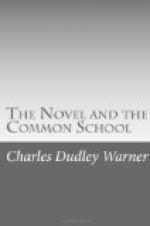It has been demonstrated by experiment that it is as easy to begin with good literature as with the sort of reading described. It makes little difference where the beginning is made. Any good book, any real book, is an open door into the wide field of literature; that is to say, of history—that is to say, of interest in the entire human race. Read to children of tender years, the same day, the story of Jimmy and a Greek myth, or an episode from the “Odyssey,” or any genuine bit of human nature and life; and ask the children next day which they wish to hear again. Almost all of them will call for the repetition of the real thing, the verity of which they recognize, and which has appealed to their imaginations. But this is not all. If the subject is a Greek myth, they speedily come to comprehend its meaning, and by the aid of the teacher to trace its development elsewhere, to understand its historic significance, to have the mind filled with images of beauty, and wonder. Is it the Homeric story of Nausicaa? What a picture! How speedily Greek history opens to the mind! How readily the children acquire knowledge of the great historic names, and see how their deeds and their thoughts are related to our deeds and our thoughts! It is as easy to know about Socrates as about Franklin and General Grant. Having the mind open to other times and to the significance of great men in history, how much more clearly they comprehend Franklin and Grant and Lincoln! Nor is this all. The young mind is open to noble thoughts, to high conceptions; it follows by association easily along the historic and literary line; and not only do great names and fine pieces of literature become familiar, but the meaning of the continual life in the world begins to be apprehended. This is not at all a fancy sketch. The writer has seen the whole assembly of pupils in a school of six hundred, of all the eight grades, intelligently interested in a talk which contained classical and literary allusions that would have been incomprehensible to an ordinary school brought up on the ordinary readers and text-books.




